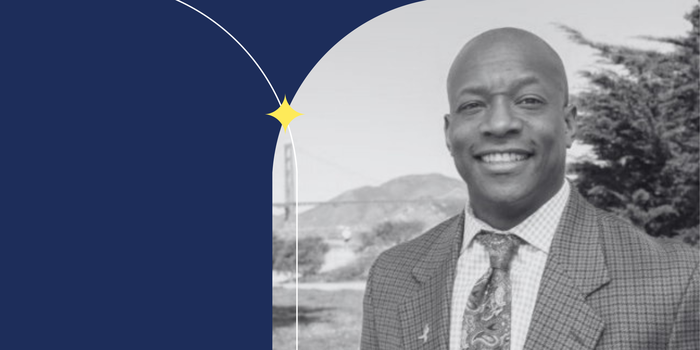
It’s not always easy turning down a perfectly good job offer, especially as a new grad. But that’s exactly what Jason McDonald did after getting his finance degree. Instead of accepting an entry-level analyst position, McDonald held out for something he thought would be better, and started out as a customer service representative at a title insurer in San Francisco.
“I figured I’d do it for a year and then go to graduate school,” McDonald says. However, as often happens, fate intervened. While working at the title insurer, a meeting with a colleague in the industry would change the trajectory of his career.
“It didn’t take long to figure out what he was making on commissions to inspire me to get into sales,” McDonald recalls. “One year led to two and two to three. With continued success and financial gain, graduate school soon became a goal I would leave behind.”
Today, McDonald is a senior vice president and managing director at the real estate tech company Doma—a position he likely never would have earned had he continued with the more traditional finance path.
Here, McDonald shares how growing up in a melting pot has impacted his life and career, what it means to be a servant leader, and how Doma supports diversity, equity, and inclusion.
You’ve spent your entire career in the title industry in the Bay Area. Why do you value working there?
Over the years, opportunities have arisen to leave. However, growing up in a melting pot has proved the most significant contributor to my professional and personal success and growth, which is why I've stayed in the Bay Area all these years.
Being raised in a melting pot has helped me have an open mind regarding politics, business strategies, education, religion, gender rights, and equality. This expanded mindset has allowed me to relate, be comfortable, and thrive in many different settings. For example, while in college, one of my roommates was Chinese and for several years I was blessed to have learned a great deal about East Asian culture. I even picked up keywords and phrases in Cantonese. This experience later proved very significant when I took over a territory in sales that was predominantly East Asian. I did exceptionally well thanks to my awareness of the culture, and was very productive in this territory. This chapter helped set the stage for many of the meaningful and reciprocal business relationships that I still hold dear today.
How would you define your leadership style? And what advice do you have for others who hope to achieve leadership roles?
I was once asked, “If you were a bumper sticker, what would you say?” Without taking a breath, I replied, “In giving, we receive.” I have been a servant leader for as long as I can remember. As such, my advice is to lead by example in your current position and make others around you better. Give more than is expected of you and have goals around your leadership aspirations. Finally, make sure you’re at a place where growth opportunities exist. It is through these steps that I’ve found leadership growth.
Tell us about the BLACC@DOMA employee resource group (ERG). What impact has this initiative had on the company and you personally? In what other ways does Doma support inclusion?
The BLACC@Doma ERG has been a fantastic, inspiring, and impactful resource for Doma. BLACC@Doma has given those who identify as Black a space at work to feel as though they can be themselves and have relevance outside their job functions.
Along with ERGs, Doma has a Cultural Conversations program, which have been some of my favorite and most enjoyable events. Whether it’s Black History Month, Women’s History Month, Hispanic Heritage Month, or LGBTQ+ rights and legislation discussions, I have benefited from the intentional nature and impact of these conversations. Being able to share openly and discuss our respective cultures intimately has allowed all of our Doma associates to celebrate their differences and feel valued in ways that go deeper than the confines of our day-to-day responsibilities.
What is the biggest challenge you’ve faced as a team leader, and how did you overcome it?
My biggest challenge as a leader has always been patience in achieving results. As for overcoming it, this has been a career-long work in progress. I make sure to surround myself with teammates who care a lot about their jobs (even more than I do).
You’re organizing a dinner party with your biggest role models. Who’s invited and what will you talk about?
I would invite my mother, my grandfather, the Reverend Richard Allen Washington, Dr. Martin Luther King Jr., Julius Irving (aka Dr. J), Eric Dickerson, and my very first mentor, Paula Armstrong. As to our conversation, I would ask each of them, “What gave you the greatest joy in life?”
What’s the best career advice you’ve ever received?
Without a doubt the best career advice I’ve ever received is if you want people to love you then bring them business, make yourself indispensable, and always have a plan (and a backup in case the original isn’t successful).